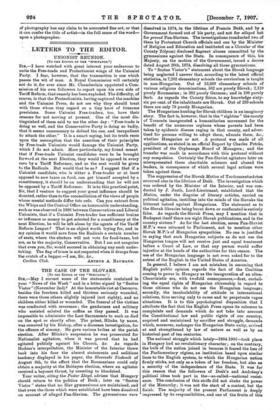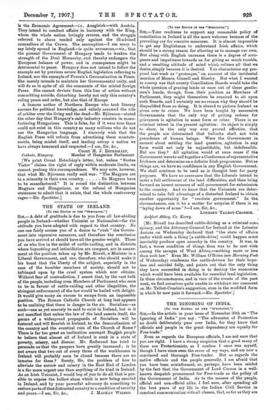THE CASE OF THE SLOVAKS.
LTD THE EDITOR OF THE " SpEcT,uroa." J SIR,—May I correct some of the statements contained in your "News of the Week " and in a letter signed by "Scotus Viator".(November 2nd)? At the lamentable riot at Csernova, besides the fourteen killed and thirteen seriously wounded, there were three others slightly injured (not eighty), and no children either killed or wounded. The funeral of the victims was conducted with reverence ; the gendarmes and military who assisted saluted the coffins as they passed. It was impossible to administer the Last Sacraments to such as died on the spot or shortly after. The priest, Hlinka by name, was removed by his Bishop, after a diocesan investigation, for the offence of simony. He gave various bribes at the parish election. After Hlinka's suspension he was prosecuted for Nationalist agitation, when it was proved that be had agitated publicly against his Church, &c. As regards Hodzsa's interpellation, the Minister of the Interior threw back into his face the absurd statements and seditious tendency displayed in his paper, the Slovenski Tizdenik of August 6th, to the effect that the Roumanians could only obtain a majority at the Belenyes election, where an agitator
received a bayonet thrust, by resorting to bloodshed. • Your writer, citing the Pester Lloyd, advises that Hungary shoUld return to the politics of De4.1c ; later on " Scotus Viator " states that no Slav gymnasiums are maintained, and that even the three which were established have been dissolved on account of alleged Pan-Slavism. The gymnasiums were
dissolved in 1874, in the lifetime of Francis Deik, and by .a Government formed out of his party, and not for alleged but- for proved Pan-Slavism. The investigations (conducted two of
them by Protestant Church officials and one by the Minister • of Religion and Education and instituted on a Circular of the
County ZOlyom) disclosed flagrant abuses committed by the gymnasiums against the State. In consequence of this, his Majesty, on the motion of the Government, issued a decree. dated August 20th, 1874, dissolving all three gymnasiums.
To "Scotus Viator's" statement about the Slovak language being neglected I answer that, according to the latest official statistics, in 7,202 elementary schools the curriculum is taught in non-Hungarian. Out of 13,269 elementary schools of various religious denominations, 502 are purely Slovak; 2,119 purely Roumanian ; in 382 purely German; and in 108 purely Serb. As regards the County Siiros, to my knowledge sixty- six per cent. of the inhabitants are Slovak. Out of 233 schools there are only 78 purely Hungarian.
The Hungarians hunting for Slovak children is an imaginary story. The fact is, however, that in the " eighties" the county of Trencsen inaugurated a humanitarian movement for the benefit of the numerous orphans whose parents had been taken by epidemic disease raging in that county, and adver- tised for persons willing to adopt them, educate them, &c., whether Hungarian or not. A protocol was made of all applications, as stated in an official Report by Charles Petras, president of the Orphanage Board of Managers.; and the transfer was made in accordance with this protocol without any compulsion. Certainly the Pan-Slavist agitators later on misrepresented these charitable schemes and abused the leaders, in consequence of which several legal actions were taken against them.
The suppression of the Slovak Matica of TurOczszentinarton occurred also in the lifetime of Dedk. The investigation which was ordered by the Minister of the Interior, and was con- ducted by J. Justh, Lord-Lieutenant, established that the Afatica, under the disguise of literary articles, carried on political agitation, instilling into the minds of the Slovaks the bitterest hatred against Hungarians. The statement as to the Slovak libraries being burnt down or confiscated is entirely false. As regards the Slovak Press, may. I mention that in Budapest itself there are eight Slovak publications, and in the country sixteen ? As for the last election, seven Pan-Slavist M.P.'s were returned to Parliament, not to mention other Slovak M.P.'s of Hungarian sympathies. No one is justified in saying that such Hungarian subjects as do not use the Hungarian tongue will not receive just and equal treatment before a Court of Law, or that any person would suffer injustice at the hands of the authorities for this reason. The use of the Hungarian language is not even asked for to the extent of the English in the United States of America.
In general, I believe I am not mistaken in assuming that English public opinion regards the fact of the Coalition coming to power in Hungary as the inauguration of an ultra. Chauvinistic era, with twofold consequences,—first, curtail. ing the equal rights of Hungarian citizenship in regard to those citizens who do not use the Hungarian language; secondly, the incalculability of attitude in international relations, thus serving only to cause and to perpetuate vague situations. It is to this psychological disposition that I attribute the fact that the English Press opens its columns to complaints and demands which do not take into account the Constitutional law and public rights of our country, acquired and maintained by sacrifice and struggle, demands which, moreover, endanger the Hungarian State unity, arrived at and strengthened by law of nature as well as by an historical past of ten centuries.
The national struggle which lately-1904-1906—took place in Hungary had no revolutionary character ; on the contrary, the bulk of the nation joined in because it feared the loss of the Parliamentary regime, an institution based upon similar lines to the English system, to which the Hungarian nation firmly sticks, not only as a token of her freedom, but also as a security of the independence of the State. It was fel; this reason that the followers of Deilk's and Andrissfs political ideas took part in the—so-called—national resist- ance. The conclusion of this strife did not shake the power of the Monarchy ; it was not the start of a contest, but the finish. The majority of the present Parliament is deeply impressed by its responsibilities, and one of the fruits of this
is the Economic Agreement--i.e., Ausgleich—with Austria. They intend to conduct affairs in harmony with the King wham the whole nation lovingly reveres, and the struggle referred to above tended only against the ill-advised counsellors of the Crown. The assumption—I am sorry to say lately spread in England—is quite erroneous,—viz., that the present Government of Hungary tends to weaken the strength of the Dual Monarchy, and thereby endangers the European balance of power, and in consequence might be detrimental to peace. Hungary does not intend to follow the example set by previous severe English legislation referring to Ireland, nor the example of Prussia's Germanisation in Posen. She merely intends to maintain her Governmental unity, and will do so in spite of all the comments of the misled foreign Press. She cannot deviate from this line of action without committing suicide, disturbing hereby not only this country's ruling peace and order, but also that of Europe.
A famous author of Northern Europe who took literary success for political knowledge, and calmly assumed the role of arbiter over the living and the dead—Mr. Bjornson—stated the other day that Hungary's only industry consists in manu- facturing Hungarians. This is false, for if it were true there could not exist in this country so many millions who do not use the Hungarian language. I sincerely wish that the English Press will refrain from advertising these misstate. ments, being misled itself, and leading astray, a nation we have always honoured and respected.—I am, Sir, &c.,
Count J. ESTERHAZY,
estfkinir, Hungary. Member of Hungarian Parliament.
[We print Count Esterhazy's letter, but, unless "Scotus Viator" Claims the right of reply within moderate limits, we cannot prolong this correspondence. We may note, however, that what Mr. Bjornson really said was : " The Magyars are
in a minority in their own country , - So Magyars have to be manufactured." It is round the distinction between Magyars and Hungarians, or the refusal of Hungarian statesmen to admit that it exists, that the whole controversy rages.—ED. Spectator.]











































































 Previous page
Previous page